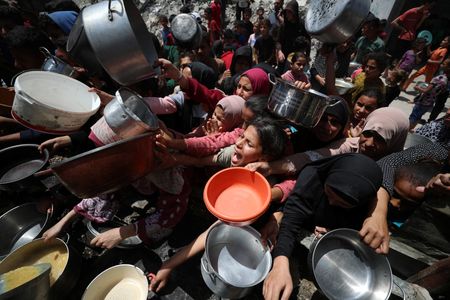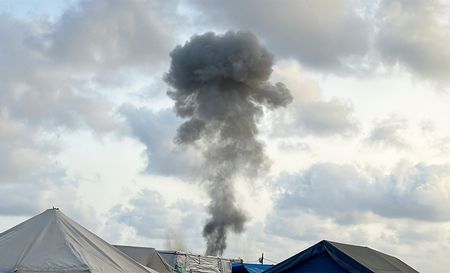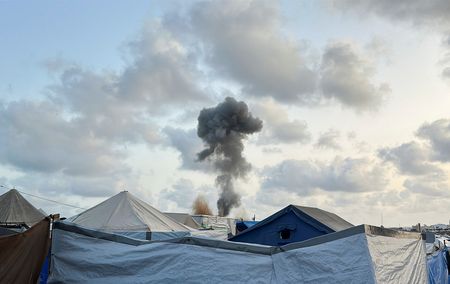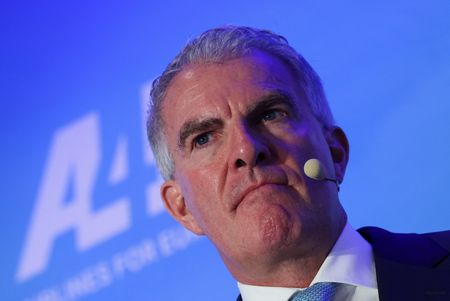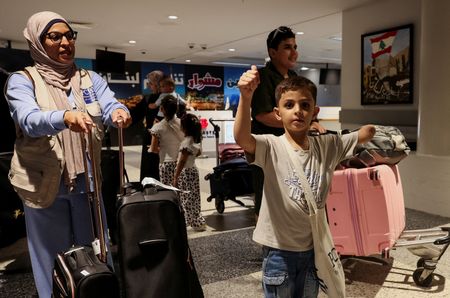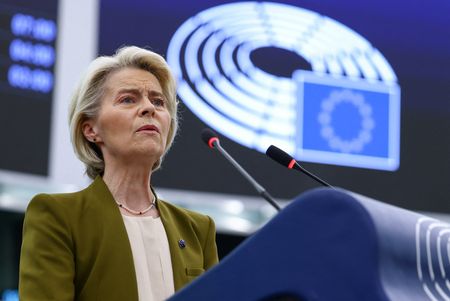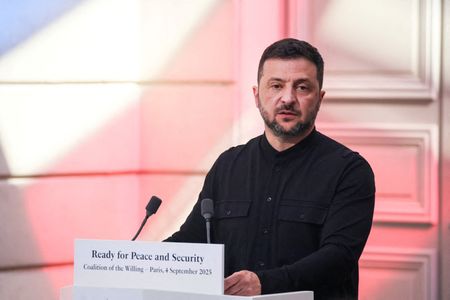By May Angel and Nidal al-Mughrabi
JERUSALEM/CAIRO (Reuters) -Prime Minister Benjamin Netanyahu said on Monday Israel would control the whole of Gaza despite mounting international pressure that pushed it to lift a blockade on aid supplies in the face of warnings of looming famine.
The Israeli military, which announced the start of a new operation on Friday, warned residents of the southern city of Khan Younis on Monday to evacuate to the coast immediately as it prepared “an unprecedented attack”.
Netanyahu said in a video message Israel would achieve “complete victory” with both the release of the 58 hostages still held by Hamas in Gaza and the destruction of the Palestinian militant group.
Even as the military warned of the attack, Reuters reporters saw aid trucks heading towards northern Gaza after increasing global alarm forced Netanyahu to lift a blockade imposed in March.
Israel has said aid was being stolen by Hamas, a charge Hamas denies. European countries including France, Germany and Britain have said the situation in Gaza is intolerable, and even U.S. support appeared to be wavering.
Netanyahu said U.S. senators he has known for years as supporters of Israel, “our best friends in the world”, were telling him the scenes of hunger were draining vital support and bringing Israel close to a “red line, to a point where we might lose control”.
“It is for that reason, in order to achieve victory, we have to somehow solve the problem,” he said, in a message apparently addressed to far-right hardliners in his government who have insisted aid be denied to Gaza.
The United Nations has long said Gaza needs at least 500 trucks of aid and commercial goods every day. The World Food Programme has said more than 116,000 metric tonnes of food – enough to feed one million people for up to four months – was standing ready to be brought in.
However it remained unclear how much aid would be allowed in and how it would be distributed before the launch of a U.S.-sponsored plan to employ private contractors to distribute aid, which the United Nations and other aid groups have rejected.
The Israeli military said five trucks had entered Gaza on Monday, although U.N. aid officials said nine trucks had been cleared to enter, a quantity U.N. aid chief Tom Fletcher described as “a drop in the ocean”.
Under a heavily-criticized U.S.-backed plan to get aid to Palestinians, a newly created Gaza Humanitarian Foundation aims to start work in Gaza by the end of May. U.N. aid chief Tom Fletcher has said that time should not be wasted on the alternative plan.
A source familiar with the plan said the foundation has already received more than $100 million in commitments. It was not immediately clear where the money was coming from.
Israeli military spokesman Nadav Shoshani said it would take time to create a situation where hundreds of trucks were able to enter daily but added: “I think that’s also a decision for the political echelon of how many will come in,” he told reporters.
UNDERCOVER OPERATION
Israeli strikes have killed more than 500 people in the past eight days as the military campaign has intensified, with at least 40 people killed on Monday, according to local medical workers.
One of the strikes killed seven at a school housing displaced families in Nuseirat, central Gaza, and three in a house in nearby Deir Al-Balah, local health authorities said.
The military said it hit 160 targets, including anti-tank positions, underground infrastructure and a weapons storage point as part of what it has dubbed “Operation Gideon’s Chariots”.
On Monday, residents and medics said an Israeli undercover force disguised as displaced persons killed Ahmed Sarhan, a commander of the Popular Resistance Committees, a militant group allied with Hamas in a raid in the city of Khan Younis.
As the fighting has intensified, hopes of a ceasefire appeared to be waning.
The White House said U.S. President Donald Trump continued to engage with both sides. But sources on both sides said there had been no progress in a new round of indirect ceasefire talks between Israel and Hamas in Qatar.
Former Defence Minister Yoav Gallant, who left the government last year after falling out with Netanyahu, said the fact Hamas remained in Gaza represented a “resounding failure” for the Israeli campaign and reflected the government’s failure to plan for the future of the enclave.
Netanyahu said ceasefire discussions touched on a fresh truce and hostage deal as well as a proposal to end the war in return for the exile of Hamas militants and the demilitarisation of Gaza – terms previously rejected by Hamas.
Senior Hamas official Sami Abu Zuhri blamed Israel for the lack of progress at the talks and said escalating its offensive would be “a death sentence” for remaining hostages.
Israel’s ground and air war has devastated Gaza, displacing nearly all its residents and killing more than 53,000 people, many of them civilians, according to Gaza health authorities.
The war erupted after Hamas-led militants attacked Israeli communities near Gaza’s border on October 7, 2023, killing about 1,200 people, mostly civilians, and seizing 251 hostages, according to Israeli tallies.
(Reporting by Nidal al-Mughrabi and May Angel; additional reporting by Emily Rose; writing by James Mackenzie; editing by Mark Heinrich and Andrew Heavens)



